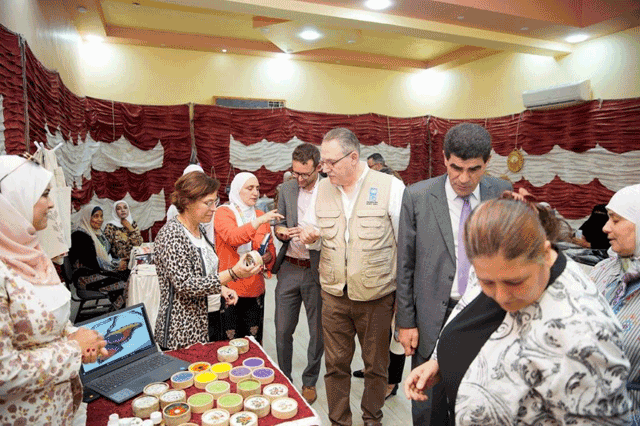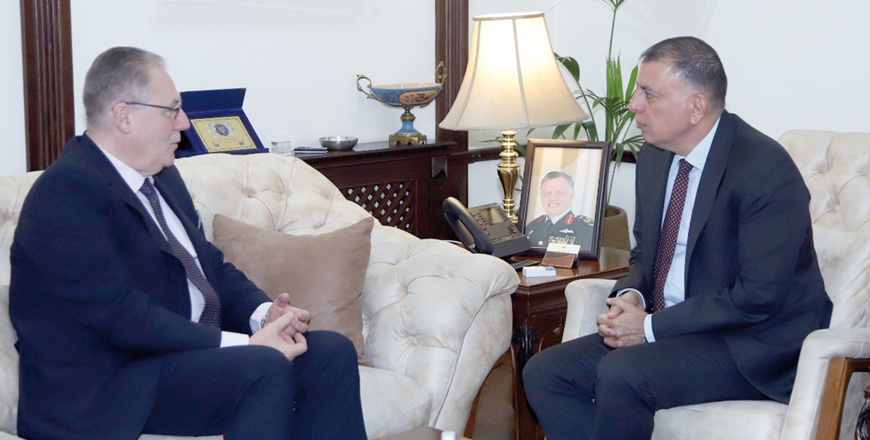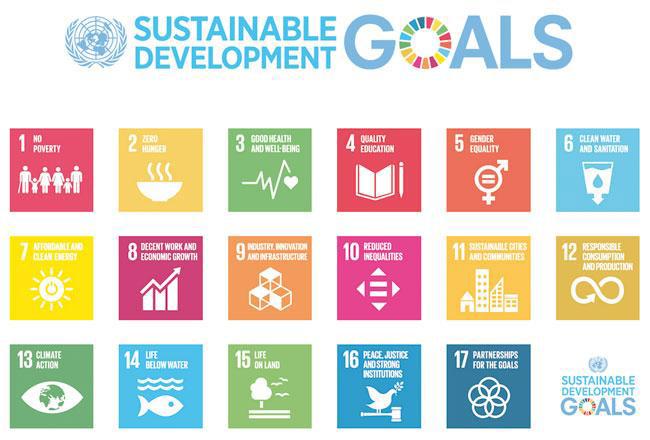You are here
SDG-aligned investments imperative for Jordan’s green growth — UNDP official
By Mays Ibrahim Mustafa - Jun 17,2023 - Last updated at Jun 17,2023

Assistant Secretary-General and Director of the Regional Bureau for the Arab States at UNDP Abdallah Al Dardari visits women businesses supported by the Women Economic Empowerment programme in Northern Shouneh (Photo courtesy of UNDP)
AMMAN — Investments aligned with the UN Sustainable Development Goals (SDGs) are crucial for the generation of green job opportunities and green enterprise development in Jordan, said Assistant Secretary-General and Director of the Regional Bureau for the Arab States at UNDP Abdallah Al Dardari in an exclusive interview with The Jordan Times on Thursday.
The last few years of global crises, including the outbreak of the COVID-19 pandemic, the war in Ukraine and increased climate challenges have lead to a worldwide deceleration in progress towards the 2030 Agenda for Sustainable Development, adopted by all United Nations member states in 2015, Dardari said.
“The world cannot afford a future that’s not green; we are currently in a race against time to accelerate collective action towards achieving the SDGs,” Dardari told The Jordan Times.
SDG-oriented investments
In Jordan, the United Nations Development Programme (UNDP) is currently working closely with the government on climate action and accelerating progress towards the SDGs by integrating the goals in its macro-fiscal framework and national policies, Dardari added.
Green investments can help mobilise better financing, reduce costs, generate more jobs and produce long-term environmental benefits, he noted.
In today’s challenging economic environment, marked by high interest rates, tagging private-sector investments to the SDGs is a “strategic move” that “opens up new markets and new sources of lower cost financing”, in addition to creating a positive impact on society, the environment and the national economy, he said.
UNDP’s work in advocating for SDG-oriented investments aligns with Jordan’s “integrated” vision in regard to political, economic and administrative reforms, Dardari added.
Towards a circular economy
Embracing a circular economy and adopting a green path towards industrialisation will help address the Kingdom’s challenges related to creating quality jobs for a highly skilled and educated young population, Dardari said.
It is also necessary to adopt a gender-inclusive approach in laying the foundation for a circular economy, he added.
“In many societies, women took the lead in promoting sustainable waste management practices a long time ago as part of their daily household chores and responsibilities,” he noted.
This highlights the importance of expanding the opportunity for women to take “leading roles” in driving this transition, especially considering Jordan’s “highly educated” female population, which has the potential to advance the country’s development across all areas, he added.
The way forward
Dardari overviewed expected outcomes of the 2023 SDG summit, which marks the mid-point of the 2030 Agenda’s implementation.
The summit will focus on acceleration plans amidst various global challenges and crises, in addition to promoting a renewed global commitment to the SDGs, he explained.
The summit is set to take place at the United Nations Headquarters in New York City on September 18 and 19 of this year. There, world leaders will gather and review the implementation of the 2030 Agenda for Sustainable Development and the 17 SDGs.
The UN official also expressed hope that the 28th session of the Conference of the Parties (COP 28), which will be hosted by the UAE in November 2023, results in a “clear and robust trajectory for climate action finance”.
Refugee crises
Dardari noted the importance of the Climate/Refugee Nexus Initiative that Jordan put forward during COP27, adding that discussions are currently underway to find ways to promote the initiative, get more countries to endorse it and translate the initiative into a detailed action plan.
He also commended the “generosity and open-mindedness” of Jordanians in welcoming refugees throughout the protracted Syrian crises, “viewing them as their brothers and sisters coming in a time of need”.
Dardari added that the Kingdom, which is a resource-scarce country and the second largest refugee host per capita worldwide, has demonstrated “tremendous resilience” over the past twelve years.
Moreover, he stressed UNDP’s commitment to supporting Jordan’s mission to ensure that refugees are not left behind, especially amid a difficult time in the region, marked by conflicts as well as climate and economic challenges.
UNDP and UNHCR, the UN Refugee Agency, co-lead the Regional Refugee & Resilience Plan (3RP), an “integrated humanitarian and development plan in response to the Syrian crisis”, according to Dardari.
Related Articles
AMMAN — Interior Minister Mazen Faraya and Abdallah Dardari, the assistant secretary-general and director of the Regional Bureau for Arab St
AMMAN — The United Nations and the government of Jordan have recently launched a joint programme to develop strategic investments to acceler
AMMAN — Initial results of a study prepared by the UN Development Programme (UNDP) and the Economic and Social Commission for Western Asia (


















